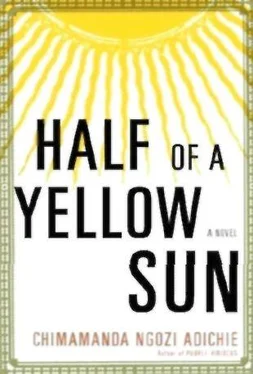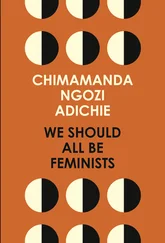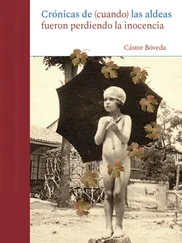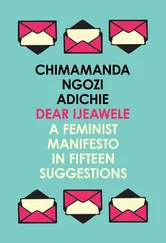When he woke up, a radio was turned on high and High-Tech was sobbing. Umuahia had fallen. Biafra 's capital was lost. A soldier threw his hands up and said, "That goat, that goat was a bad omen! All is lost! We have to surrender!" The other soldiers were subdued. Even the commander's saying that he was aware of a secret counterattack plan to recover Umuahia did not lift their spirits. But the announcement that His Excellency would be visiting did. The soldiers swept the compound, washed their clothes, lined themselves on benches to welcome him. When the convoy of jeeps and Pontiacs drove into the compound, they all stood up and saluted.
Ugwu's salute was slack, because he was worried about Olanna and Master and Baby in Umuahia, because he was not interested in His Excellency, because he did not care for the commander. He did not care for any of the officers, with their superior sneers and the way they treated their soldiers like sheep. But there was a captain he admired, a solitary and disciplined man called Ohaeto. And so the day that Ugwu found himself in the trench next to Captain Ohaeto, he was determined to impress him. The trench was not wet; there were more ants than spiders. Ugwu could tell that the vandals were closer, from the clatter of gunfire and the boom of mortars. But there was not enough light to see for certain. He really wanted to impress Captain Ohaeto; if only the light were not so poor. He was about to connect the cable and plug when something whistled past his ear and then, right afterward, a stinging pain burned into his back. Beside him, Captain Ohaeto was a bloodied, mangled mass. Then Ugwu felt himself lifted up above the trench, helplessly, haplessly. And when he landed, it was the force of his own weight, rather than the pain firing up his whole body that stunned him into silence.
Richard shifted as far awayas he could from the two American journalists in the car, pressing himself against the door of the Peugeot. He really should have sat in front and asked the orderly to sit in back with them. But he had not imagined that they would smell so bad, Charles the plump one wearing a squashed hat and Charles the redhead with his chin covered in ginger hair.
"One Midwestern and one New York journalist coming to Biafra, and we're both named Charles. What were the odds?" the plump one said, laughing, after they introduced themselves. "And both our moms call us Chuck!"
Richard was not sure how long they had waited before boarding their flight at Lisbon, but the wait at Sao Tome for a relief flight to Biafra had stretched to seventeen hours. They needed a bath. When the plump one, sitting next to Richard, began to talk about his first visit to Biafra at the beginning of the war, Richard thought he needed mouthwash, too.
"I came in a real plane and we landed at Port Harcourt airport," he said. "But this time I was sitting on the floor of a plane flying with no lights, alongside twenty tons of dried milk. We flew so fucking low, I looked out and could see the orange bursts of the Nigerian antiaircraft. I was scared shitless." He laughed, his fat-padded face broad and pleasant.
The redhead did not laugh. "We don't know for sure that it was Nigerian fire. The Biafrans could have put it on."
"Oh, come on!" The plump one glanced at Richard, but Richard kept his face straight. "Of course it was Nigerian fire."
"The Biafrans are mixing up food and guns in their planes, anyway," the redhead said. He turned to Richard. "Aren't they?"
Richard disliked him. He disliked his washed-out green eyes and his red-freckled face. When he had met them at the airport and handed them their passes and told them he would be their guide and that the Biafran government welcomed them, he had disliked the redhead's expression of scornful amusement. It was as if he were saying, You are speaking for the Biafrans?
"Our relief planes carry only food supplies," Richard said.
"Of course," the redhead said. "Only food supplies."
The plump one leaned across Richard to look out of the window. "I can't believe people are driving cars and walking around. It's not like there's a war going on."
"Until an air raid happens," Richard said. He had moved his face back and was holding his breath.
"Is it possible to see where the Biafran soldiers shot the Italian oil worker?" the redhead asked. "We've done something on that at the Tribune, but I'd like to do a longer feature."
"No, it's not possible," Richard said sharply.
The redhead was watching him. "Okay. But can you tell me anything new?"
Richard exhaled. It was like somebody sprinkling pepper on his wound: Thousands of Biafrans were dead, and this man wanted to know if there was anything new about one dead white man. Richard would write about this, the rule of Western journalism: One hundred dead black people equal one dead white person. "There is nothing new to tell," he said. "The area is occupied now."
At the checkpoint, Richard spoke Igbo to the civil defender. She examined their passes and smiled suggestively and Richard smiled back; her thin tall breastlessness reminded him of Kainene.
"She looked like she was real interested," the plump one said. "I hear there's a lot of free sex here. But the girls have some kind of sexually transmitted disease? The Bonny disease? You guys have to be careful so you don't take anything back home."
His presumptuousness annoyed Richard. "The refugee camp we are going to is run by my wife."
"Really? She been here long?"
"She's Biafran."
The redhead had been staring out of the window; he turned now toward Richard. "I had an English friend at college who really went for colored girls."
The plump one looked embarrassed. He spoke quickly. "You speak Igbo pretty well?"
"Yes," Richard said. He wanted to show them the photos of Kainene and the roped pot, but then he thought better of it.
"I'd love to meet her," the plump one said.
"She's away today. She's trying to get more supplies for the camp."
He climbed out of the car first and saw the two interpreters waiting. Their presence annoyed him. It was true that idioms and nuances and dialects often eluded him in Igbo, but the directorate was always too prompt in sending interpreters. Most of the refugees sitting outside watched them with vague curiosity. An emaciated man was walking around, a dagger strapped to his waist, talking to himself. Rotten smells hung heavy in the air. A group of children was roasting two rats around a fire.
"Oh, my God." The plump one removed his hat and stared.
"Niggers are never choosy about what they eat," the redhead muttered.
"What did you say?" Richard asked.
But the redhead pretended not to have heard and hurried ahead with one interpreter, to speak to a group of men playing draughts.
The plump one said, "You know there's food piled in Sao Tome crawling with cockroaches because there's no way to bring it in."
"Yes." Richard paused. "Would it be all right if I gave you some letters? They're to my wife's parents in London."
"Sure, I'll put them in the mail as soon as I get out of here." The plump one brought out a large chocolate bar from his knapsack, unwrapped it, and took two bites. "Listen, I wish I could do more."
He walked over to the children and gave them some sweets and took photographs of them and they clamored around him and begged for more. Once, he said, "That's a lovely smile!" and after he left them, the children went back to their roasting rats.
The redhead walked across quickly, the camera around his neck swinging as he moved. "I want to see the real Biafrans," he said.
"The real Biafrans?" Richard asked.
"I mean, look at them. They can't have eaten a meal in two years. I don't see how they can still talk about the cause and Biafra and Ojukwu."
Читать дальше












